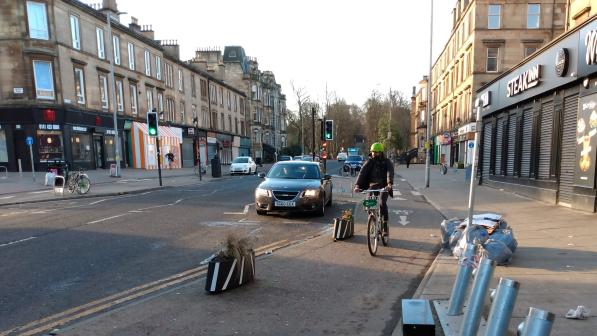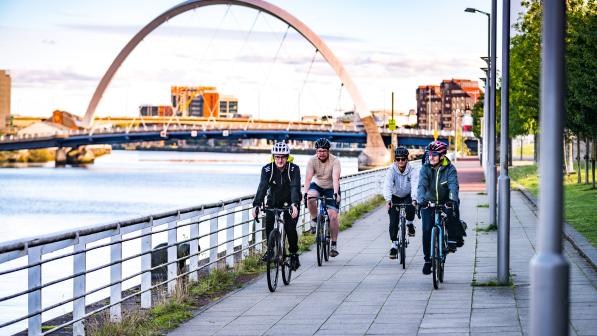Has the Scottish Government delivered for cycling?

A year has gone by since the SNP and Scottish Greens agreed to work together in government and they published a programme of work for the year and further into the parliamentary term.
The Programme for Government 2021-22 was the first set of policies since the historic Bute House Agreement which brought the Greens into government and saw Patrick Harvie MSP appointed as Scotland’s first ever Minister for Active Travel.
The agreement with the Greens included a swathe of cycle friendly policies to add to the SNP manifesto commitments, including the record-breaking commitment to boost spending on active travel to 10% of the transport budget.
But one year on, have the promises made in the Programme for Government (PfG) been met? And what progress has been made on the plans the Scottish Government set out?
The following status report on progress over the past year comes ahead of the next Programme for Government scheduled for 6 September.
I've used a Red Amber Green rating to classify progress against 14 cycling, active travel or sustainable travel policies.
Summary
Key
|
|
Zero progress or no information available. |
|
|
Some progress made but commitment not met. Action may be ongoing or set for future. |
|
|
Commitment met or positive progress in meeting future commitment. |
|
|
Commitment |
Status |
|
|
Active travel funding |
Commitment remains strong. Active travel budget boosted to £150m – slightly less than needed for a straight-line funding trajectory to £320m. |
|
|
Cycling, Walking and Safer Routes grant |
Funding boosted from £24m to £35m for 2022/23 |
|
|
National Cycle Network Plan funding |
Funding for the National Cycle Network increased to over £10m for 2022/23 |
|
|
Free bikes for kids |
Pilot schemes ongoing and have provided over 2000 free bikes. Scheme to be rolled out more widely in 2023. |
|
|
Scotland Cycle Repair Scheme |
Over 50,000 bikes fixed since Aug 2020. Scheme has re-opened for 2022-23. |
|
|
Active Freeway Network |
No progress made |
|
|
20-minute neighbourhoods |
Concept defined and included in the National Planning Framework. Still a way to go to understand steps for delivery. |
|
|
Safe to School initiatives |
No information available |
|
|
20mph zones |
No information on this initiative although task group has been meeting |
|
|
Car km reduction Route Map |
Route map consultation completed |
|
|
Low Emission Zones |
Glasgow LEZ begun for buses. Others LEZs come into force in 2023 and 2024. |
|
|
Bring ScotRail into the public sector |
Completed |
|
|
Free bus travel for under 22s |
Completed |
|
|
New Cycling Framework for Active Travel |
Not yet published for consultation although work ongoing |
Funding
‘Ensure that at least £320 million or 10% of the total transport budget goes on active travel by 2024-25.’
The true test for this commitment will come in late 2023 when the Finance Secretary publishes the budget for 2024-25.
Since the PfG, government boosted funding from £115m to £150m for this year 2022-23, which was welcome but slightly below what was needed to create a straight-line trajectory in funding growth to achieve the £320m target.
Despite this, government has reiterated the 10% funding commitment throughout the year in publications and in speeches by the Minister.
A good indication of government intent will come in next year’s budget due to be published later this year where we are calling for active travel funding to be boosted to at least £235m.
Verdict: Commitment maintained and progress made.
‘Increasing the Cycling, Walking and Safer Routes grant for active travel infrastructure on local roads.’
‘Investment in the Sustrans 30-year National Cycle Network Plan.’
Both of these budget lines received increased funding in the past year as part of the boost to the overall active travel budget.
The Cycling, Walking and Safer Routes grant is split between local authorities to help pay for active travel projects.
Sustrans maintains the National Cycle Network for the nation.
Verdict: Commitment met.
Access to bikes
‘Informed by pilots already set up, we will start to provide free bikes to school age children who cannot afford them.’
Free bikes for kids was a headline commitment in the SNP manifesto and was included in the PfG last year.
Mr Harvie reported that by July 2022 nine pilot projects had provided 2067 bikes, including adapted and non-standard bikes, and trained recipients.
The pilots are soon to come to an end whereafter government is planning to roll out the scheme more widely.
Verdict: Progress made but too early to tell.
'Maintaining the Scotland Cycle Repair Scheme (SCRS), helping get old bikes out of storage and back onto our roads, as well as keeping well‑used bikes pedalling smoothly and safely.’
Cycling UK is proud to be able to continue to deliver this project across Scotland.
Since its launch in 2020 SCRS has provided more than 50,000 free repairs carried out by 310 cycle repair providers across Scotland.
Verdict: Delivered.
Safe space for cycling
‘Establishing an active freeway network for Scotland, comprising local networks within towns and cities and connecting settlements and major destinations with high quality, safe routes.’
No detail on the Active Freeways policy has been provided by government in the past year, despite government allocating £50m to identify and build the high-quality infrastructure.
However, the policy has appeared in other Scottish Government strategies, such as Scotland’s route map to cut car journeys by 20% by 2030, and Cycling UK partner Transform Scotland published a report recommending how the policy could be delivered.
Verdict: Not delivered – must be a priority for the coming year.
Better neighbourhoods
‘Over the course of this Parliament, we will deliver on our vision for “20-minute neighbourhoods”: places where people can have their needs met locally within a 20‑minute walk from their homes, reducing emissions and encouraging active travel.’
Crucially, this policy was included in the Scottish Government’s fourth National Planning Framework – a key way to ensure it remains a priority for the long-term.
The 20-minute neighbourhood concept has been defined more clearly. However, very little has emerged from government about how the concept will be turned into a reality.
This policy has the potential to have far reaching consequences for the future of our neighbourhoods by ensuring that people can cycle in safety for short local journeys.
Verdict: Steps made but too early to say.
‘We will work with local authorities to encourage more Safe to School initiatives, with the aim of ensuring every child who lives within two miles of school is able to walk or wheel safely.’
During the coronavirus pandemic a number of councils in Scotland introduced measures to close streets outside some schools in the morning and at home time to make them safe for children.
Despite this, the number of School Streets remains low in Scotland and there is no information from the Scottish Government on how Safe to School initiatives will be encouraged.
Verdict: No progress made on wider roll out.
'We will ensure all appropriate roads in built-up areas have a safer speed limit of 20mph by 2025, forming a task group to plan the most effective route for implementation.’
Cycling UK has called for a default 20mph speed limit for the majority of built-up areas in Scotland for a number of years.
We understand that government has established the task group to investigate how 20mph limits will be rolled out in Scotland, although, as yet no recommendations have emerged and government has not stated how it will work with local authorities to deliver the policy by 2025.
Verdict: Too early to say – must be a priority to meet the deadline of 2025.
Road traffic reduction
‘Produce a route map to reduce the use of cars – measured as ‘car kilometres’ – by 20% by 2030.’
Government consulted on its route map plan to reduce car use late in 2021, although a final version has not yet been published.
The Route Map included a range of measure to help people get out of their cars which Cycling UK welcomed but highlighted that it included insufficient policies aiming to reduce demand for car use, i.e. making the car a less attractive option by making a car journey more expensive or slower.
Verdict: Early progress made but final decisions on policies and action urgently needed.
‘Introduce low emissions zones in four of Scotland’s cities – setting vehicle emissions limits for entry to certain road spaces, and restricting access for the most polluting vehicles.’
One of the policies to reduce demand for car use, mentioned above, the Low Emission Zone (LEZ) policy had already kicked off in the last parliament and most LEZs are scheduled to be in place during the next few years.
Friends of the Earth Scotland has been vocal in criticising the proposed LEZs for affecting only 'tiny areas in our biggest cities, which will only restrict a small number of very old and polluting vehicles'.
Verdict: Too early to say – local LEZs may need strengthening to be effective.
Public transport
‘Bring ScotRail into the public sector.’
Scotrail returned to public ownership on 1 April 2022. The First Minister said the move was “a real opportunity to deliver a railway which is for the nation, and fully focused on being run for the benefit of its users - customers, staff and stakeholders, as opposed to shareholders."
Verdict: Commitment met – improvements for integrating rail journeys with cycling needed.
‘Legislate for free bus travel for under‑22’s.’
Aimed at increasing public transport usage, the free bus pass for anyone under 22 was brought in earlier this year, although the roll out has been criticised for an initial low uptake by young people.
Verdict: Commitment met.
New cycling strategy
‘A new Cycling Framework for Active Travel – to be published in 2022’.
The Cycling Action Plan for Scotland target of ‘10% of everyday journeys to be made by bike, by 2020’ was not met, and a new framework to guide action was promised by government in the PfG.
The Framework remains unpublished although Transport Scotland has been consulting with stakeholder organisations, such as Cycling UK, in its development.
Verdict: Too early to say – must drive forward a step change in action for cycling.
Big commitments were made last year on transport and cycling and it’s good to see many of these promises kept and positive progress made in the early days of this government.
However, progress has been lacking on key policies including Active Freeways, 20mph streets and School Streets and must now be urgently prioritised in the forthcoming Programme for Government.
Government’s suite of policies for the year ahead must renew commitments and deliver strong action for cycling, sustainable transport and making neighbourhoods safe and attractive places to live.








